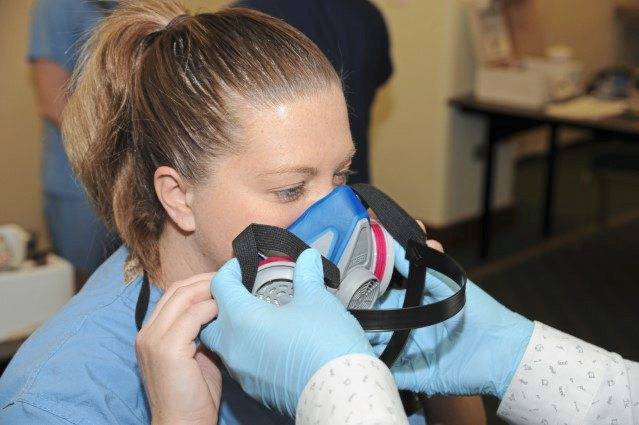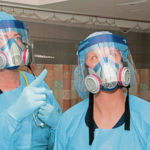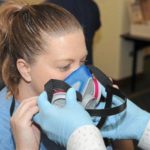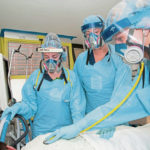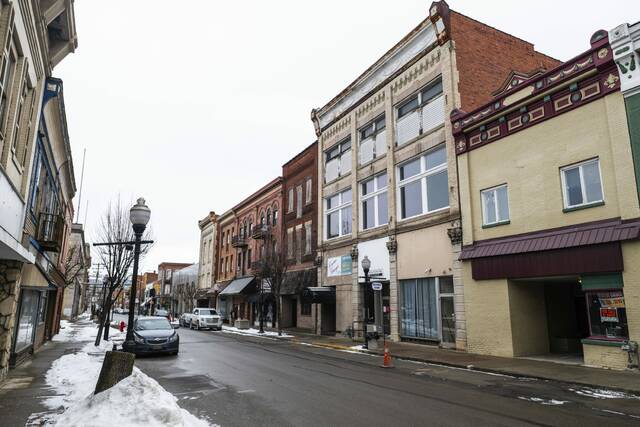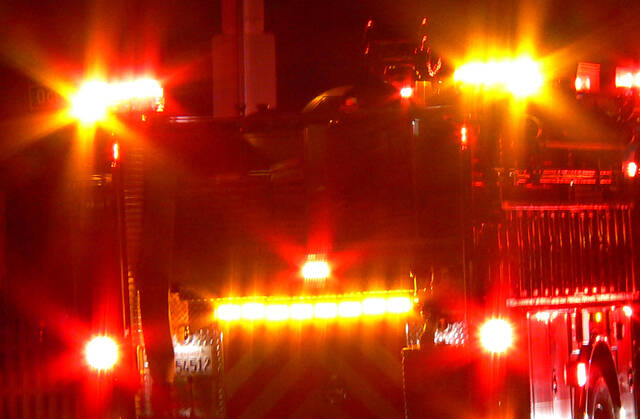Hospitals are struggling with a global shortage of personal protective equipment during the covid-19 pandemic, but one regional company received national acclaim for easing the burden.
MSA Safety, founded in 1914 in Pittsburgh and now based in Cranberry, is a global manufacturer of safety equipment for mining, construction, energy and other fields. It spent the past several months repurposing its elastomeric masks — reusable mask-respirators, typically used in industrial settings. The thick silicon completely covers the mouth and nose, with protruding filters on each side. Amid the covid-19 pandemic, they are becoming increasingly common in health care settings. Hospital systems across the country are using masks from MSA to curb the shortage of PPE.
“What it came down to for us was, is there an alternative that’s going to be at least equivalent, if not better?” said Dr. Sri Chalikonda, chief medical operations officer at Allegheny Health Network, who heads up the hospital system’s use of the masks.
Nish Vartanian, president and CEO of MSA Safety, said the collaboration began in March, early on in the pandemic, and quite serendipitously. At an Allegheny Conference meeting, he sat next to David Holmberg, president and CEO of Highmark Health, the parent company of Allegheny Health Network. As the two chatted about current events, Holmberg expressed some concern about the N95 mask shortages that hospitals around the world were experiencing. He worried AHN would feel the effects, too.
MSA had, coincidentally, just received a shipment of N95 masks. The company markets the masks in Mexico and other parts of the world and had planned to provide them to MSA employees in the area. After his conversation with Holmberg, Vartanian said the company decided instead to donate the N95s to those on the “front lines” at Allegheny Health Network.
Following that initial donation, the two entities began working together to find a longer-term solution. Highmark’s respiratory specialists and MSA’s research lab started a “working conversation,” Vartanian said. Highmark soon came to MSA Safety with a request to buy the elastomeric masks to supplement their N95 supply.
Vartanian said MSA’s masks are normally used in a broad range of industrial applications, protecting workers from high dust levels and organic vapors. But studies began showing elastomeric masks to be more cost-effective and protective during a pandemic situation.
The bulky masks are an adjustment for nurses used to the lightweight alternatives, but Chalikonda said the MSA masks are more practical than N95s in many ways. While they cost more upfront, they can be cleaned and reused for years, with the filter replaced monthly. N95s, on the other hand, are typically good for a single use. Over time, the elastomeric masks cost 10 times less.
“I think this should be part of every hospital’s stockpile,” Chalikonda said.
Before diving in with the MSA Safety masks, Chalikonda said the network was frantically considering ways to keep workers safe during an impending supply shortage. They were thinking about sterilizing N95 masks — a “last resort,” he said — and limiting the use of masks to workers interacting with only the sickest of patients.
It would have been like forgoing eyewear or gloves during the era of HIV, a blood-borne illness, Chalikonda said. Nurses and doctors would have to gamble, determining who has been exposed and which patients are at risk, even when they’re asymptomatic.
“That would be crazy,” he said. “Having a reusable resource allows us to tell our caregivers, ‘If you’re doing a procedure that’s risky, wear a mask regardless of the patient’s status.’ That’s a huge sense of comfort.”
To implement the use of the new masks, Chalikonda said, AHN created a new educational program aimed at fitting masks to individual workers and showing them how to care for them. Sterilizing the solid silicon device is far easier than the process required for the soft N95 masks. Since then, Chalikonda said the network has cut down its use of N95 masks by more than 95%.
The masks have migrated to hospital systems across the U.S. as well, as doctors begin to recognize the benefits. An article in The New York Times last month said hospitals in Boston, New Haven and Baltimore have transitioned to elastomeric mask use during the pandemic.
Regionally, AHN is the only hospital chain that has made elastomerics their primary mask in use. An article by Chalikonda and others in the Journal of the American College of Surgeons detailed their successful adaptation.
Vartanian said it’s nearly impossible for MSA to keep track of where exactly the masks are going, since they are ordered through distribution channels. He did note that, while much of the company has struggled during the pandemic-ordered halt in manufacturing, mask production and sales have soared in the last several months. The company has had to bring extra workers into its facility in Jacksonville, N.C., where the masks are manufactured.
MSA Safety is a well-known brand for respiratory protection, and has been since the World War I, Vartanian said, when the company was contracted to produce gas masks for people digging tunnels. Today, Pittsburgh firefighters use MSA Safety products, including the masks and other protective equipment.
The company’s products have been named in nationwide studies on respiratory protection – so in retrospect, Vartanian said, it’s no surprise MSA Safety would end up venturing into the health care realm.
“We always knew there could be a need,” he said. “But it wasn’t a market we were structured to sell into and focus on. This just provided an opportunity to help.”
It’s remarkable that so much success has been found, all originating from a conversation at a local business conference, Vartanian said. It’s something that is unique to the Pittsburgh region. Vartanian said he’s lived in the Pittsburgh area for around 10 years, and the collaboration among business leaders and private industries to help hospitals, schools and other important community fixtures is unparalleled in other places he’s lived.
“What’s really interesting about this community, it just goes to show that businesses reach out and work with each other,” he said.



